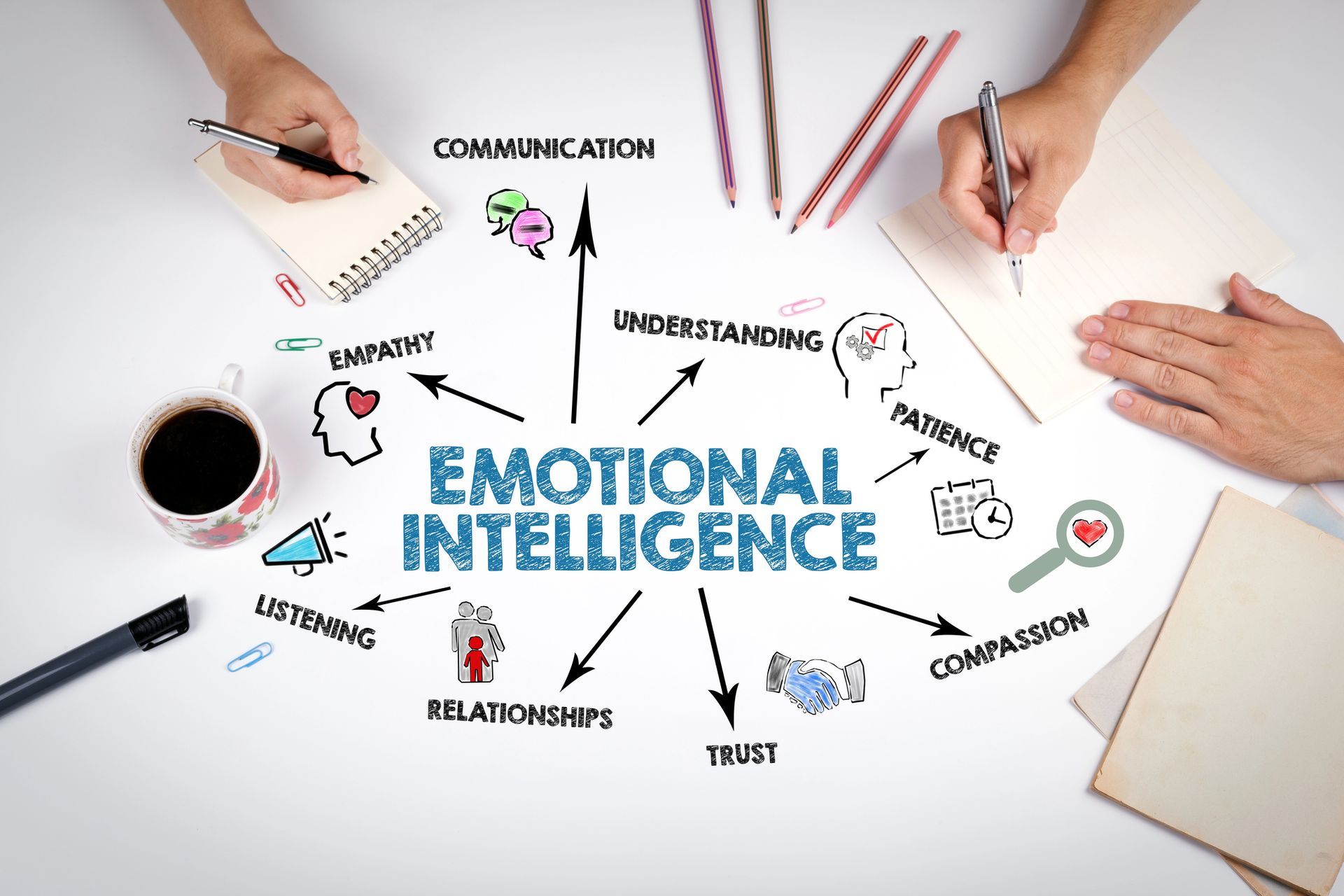What is Emotional Intelligence?
Are you having difficult conversations that turn into more conflict and withdrawal?
It could be that you are both lacking emotional intelligence.

What is Emotional Intelligence?
In a relationship, partners are able to recognize, understand and manage their own emotions and be able to attune to their partner’s emotions. It is more than being a “good communicator”. You are attending to what is going on in you, ie noticing and naming your feelings, while making space for your partner’s experience. When emotional moments arise, you respond with love, care and attention.
Marital satisfaction goes up when partners are able to build emotional intelligence together. They tend to be able to communicate their needs more openly, have trust in their relationship, and be more emotionally connected. This can be a buffer when external life gets hard.
Couples go through rough patches and have ruptures in their connection. What makes a strong relationship isn’t the absence of conflict; it is how they handle those moments. Having emotional intelligence is having moments of frustration and negative patterns and being able to move beyond them versus getting stuck in the shame and loneliness and isolation. When couples can work through the challenges together, there is a buildup of resilience and love can grow. Managing your own emotions can slow things down, and help you to create clear communication, navigating your differences more easily.
Couples who have good emotional intelligence have a stronger foundation. They can get through disagreements without lashing out and saying hurtful things or shutting down and retreating. They show up for each other emotionally especially in stressful times.
Couples with higher emotional intelligence express their feelings in ways that are respectful and loving, helpful and constructive. They understand that each other has emotional needs and don’t always have to have them spelled out. Each partner is curious and open minded when things are tense.
Like any skill, even if you don’t have high emotional intelligence, you can strengthen yourself with practice. The more that couples strengthen their emotional intelligence and become resilient together can accelerate their learning and efficiency. It can even be fun.
How to Develop Emotional Intelligence?
1. Where there is tension, bring attention.
I love this phrase from Dr. Gabor Mate. Take a pause and turn inward. Before reacting to your partner, turn inward, take a couple of deep breaths and ask yourself, what am I feeling right now? It is very important to name your emotions. Dr. Dan Siegal, Clinical Professor of Psychiatry says: Name it to Tame it. Naming your emotions gives you a better chance of regulating yourself and responding to your partner. I encourage individuals to name the raw emotions: fear, sadness, anger, joy, love, disgust. Inside Out”, the Pixar film highlights the brain and emotions. It is a well-researched film, great for learning about the brain for both kids and adults. The characters are also quite adorable and endearing.
2. Listen and understand, don’t defend.
When your partner is talking, hold off on giving your rebuttal or advice or counterpoints. Mirror back what they are saying. Chris Voss, a retired FBI hostage negotiator, used this technique when listening to the hostage taker. Saying a few words back them, “I am hearing this…. from you, helped to develop rapport and usually resulted in the hostage taker surrendering or giving up the hostages and the need for a ransom. This can be a useful and valuable tool for helping your partner feel connected while being seen and heard.
3. Validate before problem solving.
Problem solving or trying to fix your partner before hearing their point of view might turn into an argument. They may not want a solution; they just want to feel heard. Ask your partner, “how do you want me to respond”? Validating them, ie “I can see where you are coming from” can be more powerful than offering your best solution or advice.
4. Call a Time Out when emotions run high.
When the conversation starts to escalate, take a time out. Have a calm discussion and pre-arrange what your time out looks like. This protects your partner from thinking that you are walking out on a conversation. Use the code word, Time Out or the hand signal “T” to represent you are getting “flooded emotionally” and need a break to calm down. Regroup after a few minutes with cool heads and be able to reconnect safely. If either of you needs more time, be respectful and check in with each other when things feel calmer. This skill can save hurtful words and doing more relational damage.
Discover serenity and clear your body and brain at the next
Stress Detox in Calgary. This immersive experience, will offer you restfulness in the body and ease in the mind, a relaxing approach to learning how to become more emotionally intelligent, promoting self-care and enhancement of your relationships.
Register for our Newsletter and receive a Free Love Chat Package
- The 5 Steps to a Better Relationship
- Ongoing Monthly Relationship Tips
- If you want more love in your life, our relationship Love Chat Package is an easy cost-free first step.

















